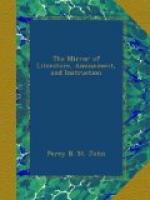VYVYAN.
* * * * *
SPIRIT OF THE PUBLIC JOURNALS.
* * * * *
LONDON AND THE PROVINCES COMPARED.
It is the nature of prosperous communities, and the fashion of modern times, to centralize too much their numbers and their powers. But the question of distribution and proportion is almost as important in politics as that of production itself. Money and manure are not the only things which are the better for being spread. London and the country would both be gainers by transplanting bodily, a hundred miles off, some dozens of its streets—inhabitants and all. There are whole counties which we should like to colonize with the surplus talent of the metropolis. That surplus talent comprises scores of men, waiting on Providence, feeding on foolish speculations, hanging on the skirts of some frivolous circle, doing nothing there, or worse than nothing, spoiling and wasting daily, who, planted out into a sphere of more favourable opportunities, are capable of being a blessing to a neighbourhood. However, it is not a case for violent measures. We do not propose that London should be compressed into London proper,—within the bills of mortality; or that its clubs should be called out on country service. Patriots, philosophers, and diners out, rusticating by royal proclamation, and under the surveillance of the police, would not come with a temper very suitable to our purpose. An experiment of that sort was made under more likely circumstance, and failed;—as all experiments must, which seek to remove the symptoms, instead of trying to act upon the cause. It was in vain that James I. pulled down the new houses as fast as they were built; and that Charles I. ordered home the country gentlemen.
Although there seems something artificial, and almost monstrous, in the actual size of London, the means which have led to this result are altogether natural. Indeed, whatever forcing has been at any time used, or prejudice fostered, has told the other way. Nothing has existed which can be called a court or courtiers for the last two hundred years; and a sort of feudal feeling still keeps our squires faithful to their halls. Two exceptions only can be set down to our institutions. The distinction of local courts obliges the English Bar to reside near Westminster; and the duration of a modern session substitutes a house for the family of a Member of Parliament, in the place of lodgings for himself. Under these circumstances, as “the wen” has not been produced, so is it not likely to be dispersed by any direct legislative application. To say the truth, the grievance, in our opinion, is not in the absolute, but in the relative amount of the wealth, intelligence, and virtue, squeezed together on those marvellous square miles upon which the capital stands. We do not grudge it the pretty




